- News
- Reviews
- Bikes
- Accessories
- Accessories - misc
- Computer mounts
- Bags
- Bar ends
- Bike bags & cases
- Bottle cages
- Bottles
- Cameras
- Car racks
- Child seats
- Computers
- Glasses
- GPS units
- Helmets
- Lights - front
- Lights - rear
- Lights - sets
- Locks
- Mirrors
- Mudguards
- Racks
- Pumps & CO2 inflators
- Puncture kits
- Reflectives
- Smart watches
- Stands and racks
- Trailers
- Clothing
- Components
- Bar tape & grips
- Bottom brackets
- Brake & gear cables
- Brake & STI levers
- Brake pads & spares
- Brakes
- Cassettes & freewheels
- Chains
- Chainsets & chainrings
- Derailleurs - front
- Derailleurs - rear
- Forks
- Gear levers & shifters
- Groupsets
- Handlebars & extensions
- Headsets
- Hubs
- Inner tubes
- Pedals
- Quick releases & skewers
- Saddles
- Seatposts
- Stems
- Wheels
- Tyres
- Health, fitness and nutrition
- Tools and workshop
- Miscellaneous
- Cross country mountain bikes
- Tubeless valves
- Buyers Guides
- Features
- Forum
- Recommends
- Podcast
£3,100.00
VERDICT:
Disc-braked steel road bike that's equally at home getting in the training miles, on a hilly sportive, or even on gravel
Weight:
9,210g
Contact:
At road.cc every product is thoroughly tested for as long as it takes to get a proper insight into how well it works. Our reviewers are experienced cyclists that we trust to be objective. While we strive to ensure that opinions expressed are backed up by facts, reviews are by their nature an informed opinion, not a definitive verdict. We don't intentionally try to break anything (except locks) but we do try to look for weak points in any design. The overall score is not just an average of the other scores: it reflects both a product's function and value – with value determined by how a product compares with items of similar spec, quality, and price.
What the road.cc scores meanGood scores are more common than bad, because fortunately good products are more common than bad.
- Exceptional
- Excellent
- Very Good
- Good
- Quite good
- Average
- Not so good
- Poor
- Bad
- Appalling
The Engineered Bicycles Gezel is a new disc brake-equipped steel road bike that's equally at home getting in the training miles, taking on a hilly sportive, or even tackling the local gravel roads.
Engineered describe it as "the ultimate all-weather mile eater", so is it? Here are five things you need to know about the bike to help you decide.
Just a quick word on pricing before we start. The price of the Gezel as built up here is £3,110, but it would be £2,670 for the same build with Mavic Aksium One Disc wheels. The standard frame and fork is £1,600. At the time of writing, Engineered Bicycles are about to offer Gezel full builds with a free Shimano 105 or Campagnolo Veloce groupset for a limited period.
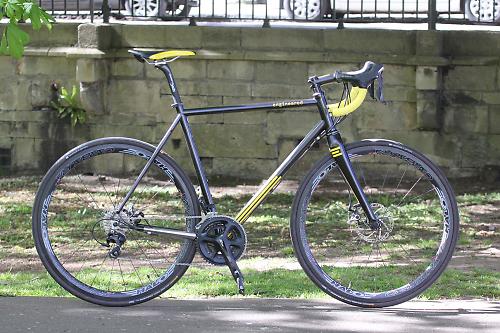
1 It's very versatile
The Gezel is built to a pretty aggressive geometry for a bike that's designed as an all-rounder, and that means you can swap from a race bike easily enough for logging the training miles.
We have the 58cm model in for review, and it comes with a stack height (the vertical distance from the centre of the bottom bracket to the top of the head tube) of 590mm and a reach (the horizontal distance between those two points) of 389mm.
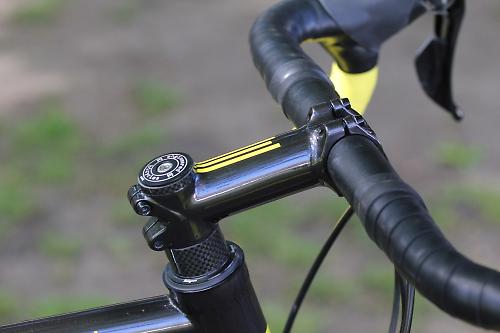
We published a First Ride on the Engineered Bicycles Donder criterium bike last year and the equivalent sized model has a 5mm shorter stack and a 12mm longer reach, giving a lower and more stretched riding position. The differences aren't huge, though, and you also need to bear in mind that the Gezel has a tall fork. The Gezel still feels like a performance-orientated setup if you whip out the headset spacers and position the stem low. Of course, you can leave them in place if you want a more relaxed riding position.
The Gezel comes with stacks of tyre clearance and that also provides you with plenty of scope to alter the ride character. Our review bike came with 28mm Continental Grand Prix 4 Season tyres and you can run tyres up to 32mm for winter conditions, dodgy road surfaces, or if you just fancy a bit more comfort.
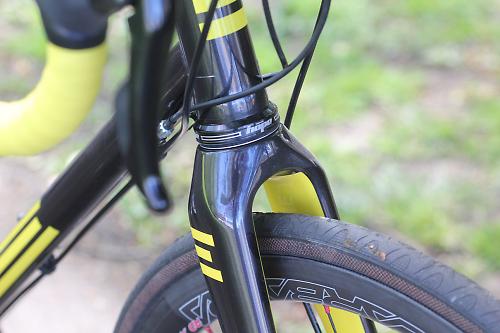
I live close to a lot of gravel roads on Salisbury Plain (they're in the military area and they're open when the red flags aren't flying) and the Gezel is a whole lot of fun across these, the wider tyres providing enough shock absorption for comfort and control, and the riding position meaning that you're not compromising speed very much. You feel you can really put the hammer down on the better surfaced sections, while having the command you need when things get bumpy.
The Gezel comes with eyelets for full-length mudguards. If you're likely to use the bike for getting in the winter training miles or year-round commuting they'll be invaluable. The maximum tyre width with mudguards fitted is 28mm.
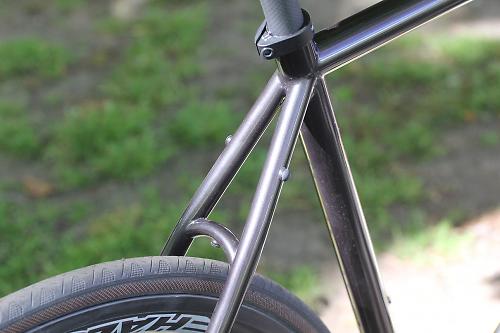
Rack mounts are an option at no extra cost. A rack might come in handy if you're going to ride the Gezel to and from work, and it would be pretty much essential if you use it for a bit of light touring, as Engineered Bicycles reckon you could. That's not something we've tried during testing because it's not the core purpose of this bike.
The Gezel's disc brakes further add to its versatility. Our bike came with TRP Spyre mechanical brakes fitted, the best non-hydraulic road bike disc brakes we've used. I wouldn't say they offer a performance that's miles better than a very good rim brake on an aluminium rim in dry conditions, but they kick its arse in the wet. Plus, you can obviously use carbon rims without any drop off in braking performance. For year-round use in a variety of conditions, discs make a lot of sense.
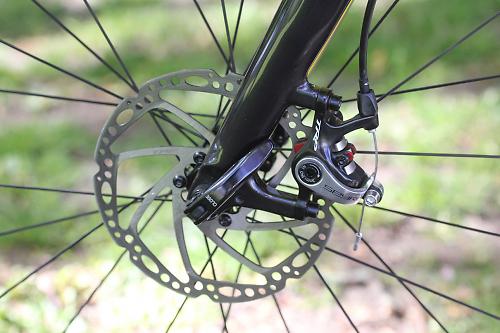
2 It's strong and durable
The Gezel is made in Italy from a Dedacciai Zero XL steel tubeset, and it is designed to be both strong and durable. Engineered Bicycles reckon that the tubes have the profiles and wall thicknesses necessary to give the frame stiffness and resilience.
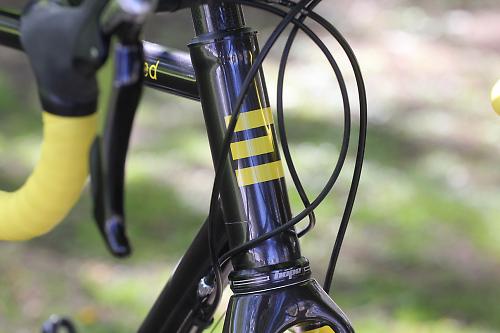
We can certainly vouch for the stiffness; there are no issues at all on that front. Like all other Engineered Bicycles frames, the Gezel has a 44mm diameter head tube and a press-fit headset for a tapered fork steerer. The upper bearing is 1 1/8in while the lower one is 1 1/2in. This makes for very good steering rigidity, the Gezel cornering accurately and predictably however hard you slam it into a turn.
Engineered use press-fit headsets, the bearings located in pressed-in cups rather than drop-fitting directly into the frame. The fact that the bearing seat is a separate component (rather than part of the frame) is intended to safeguard the frame's longevity. If the bearing seat gets worn out or damaged, you can replace it easily.
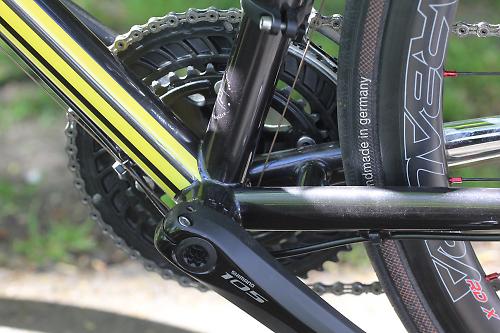
The Gezel also comes with a threaded bottom bracket as standard. Engineered reason that a bike that's going to see plenty of use in grimy conditions must be easy to maintain and a threaded BB fits that bill. No arguments from me about that. Oversized press-fit bottom brackets are great when they work properly but threaded BBs are often easier to live with and look after. That said, you can opt for a BB86 or PF30 bottom bracket standard at no extra cost, or go for BB386EVO for £30 extra. All Gezels are made to order so it's relatively straightforward to alter details like this.
The gear cabling on our review bike is fully external, and that makes for easy maintenance too. Internal cabling looks cool and it can reduce drag a touch, if that's important to you, but replacing a cable can sometimes be a pain. Holes in the frame tubes for internal cabling also provide extra opportunities for water and gunk to get inside. Again, internal cabling for both mechanical and electronic groupsets are options if you'd prefer.
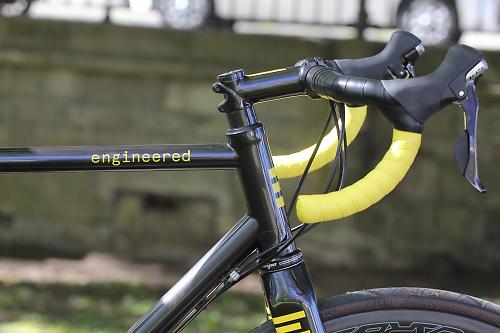
3 It's nimble
The Gezel's geometry is based on that of a race bike but it's adapted slightly for a bit more long-ride comfort. It's not as flickable as the Donder, but it's still easy to manoeuvre and it performs a lot like a race bike in the way it reacts to your input.
Our complete bike hit the scales at 9.21kg (20.3lb) so it's not ultra-lightweight, but I've taken the Gezel out on a lot of fast-paced group rides and it has got along well. Okay, it's not the kind of bike that flatters your climbing abilities, but it's more than capable on the hills, and it'll hold its own with anything on the descents thanks to the front end stiffness and the consistent performance of the disc brakes.
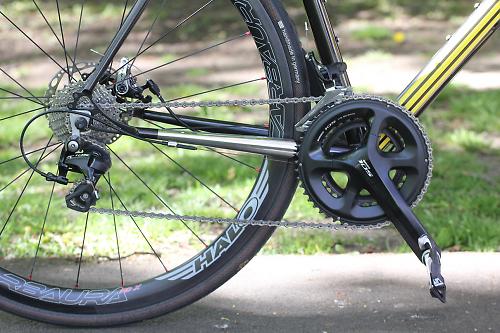
The Halo Carbaura RD X wheels on our review bike have proven themselves to be tough, handling all the gravel road abuse that's come their way without so much as a murmur, but they're not especially light. If you want to shed some weight and add a bit more zip to the ride, that would be the place to start (the Gezel comes in several standard builds but you can spec whatever you like if you speak to Engineered Bicycles).
If this was my bike, I'd be inclined to have a set of wheels for normal road use, an overbuilt set with 32mm tyres for riding on the broken roads of Salisbury Plain, and a set for best. That's a lot of wheels and the cost would add up, but it would be a lot cheaper than having a bunch of different bikes.
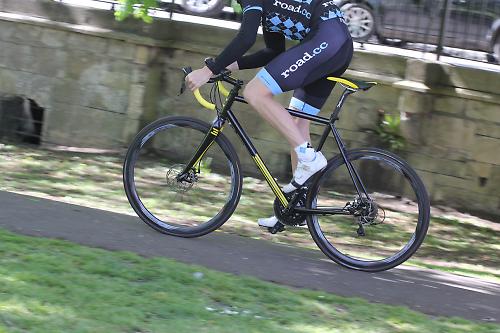
4 It provides a comfortable ride
I'm not one of those people who'd have you believe that steel necessarily provides a comfortable ride, but I've been happy riding the Gezel for hours at the weekend.
You have to be okay with the riding position (see above), of course, that's a given. Beyond that, wider tyres allow you to run lower pressures and that softens the ride. If you're after plushness, the 32mm tyres that you can fit feel incredibly forgiving if you're used to running 23s or even 25s.
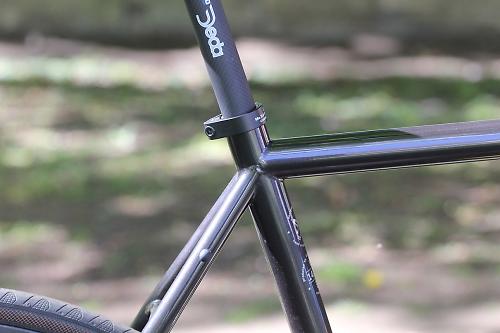
Plus, the Gezel comes with a 27.2mm diameter seatpost. Don't underestimate the difference a slim seatpost can make to the ride quality. All other things being equal, it'll deliver more flex than a chunky post and help to make the jaggedy bits feel less jaggedy (of course it's a word!).
Our review bike came fitted a Fizik Ardea saddle that provides a decent amount of flex in its nylon carbon-reinforced shell and enough padding to soak up vibration without feeling too squishy.
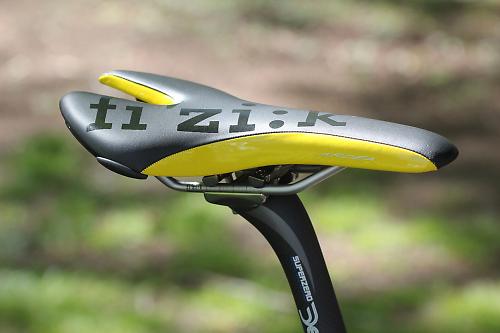
5 It's customisable
I've already mentioned that you can opt for a BB86, PF30 or BB386 bottom bracket if you'd prefer that to threaded, you can go for internal rather than external cable routing, and you can have rear rack mounts as a no-cost extra. Engineered Bicycles offer a lot of other choices too.
For a start, you can have your frame made from Columbus XCR stainless steel rather than Dedacciai Zero XL. You can also go for an integrated seatpost.
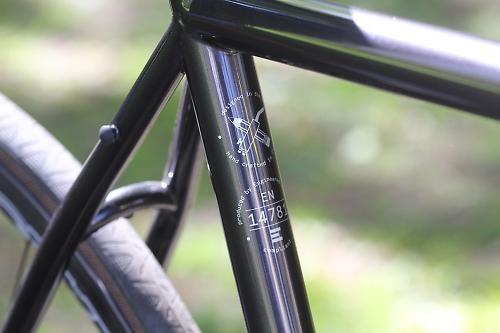
The Gezel we have for review comes with 135mm spacing between the rear dropouts and uses a standard quick release lever, but you can have interchangeable dropouts for a 135mm quick release or a 142 x 12mm thru-axle system if you prefer. That will cost you £30 extra. You can go for a thru-axle fork too, if you like.
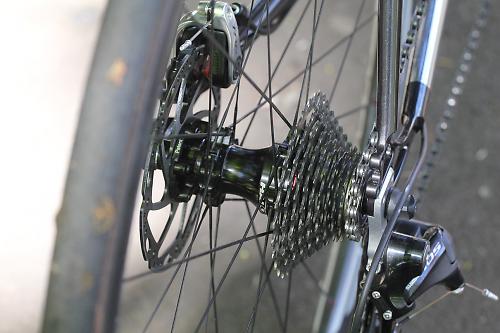
The thru-axle fork can have mudguard mounts. Engineered 3D print the mounting lugs and these are then professionally bonded to the fork. They say this has no effect on the base structure of the fork.
Oh yes, and although this grey is the standard finish, you can choose another colour if you'd prefer, or even go for a bespoke colour scheme (prices will vary according to what you have done).
On top of all that, you can have the Gezel in a made-to-measure geometry (from £50 extra, depending on complexity).
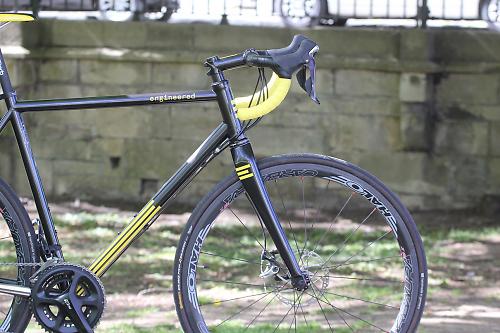
Summing up
If you're after a single bike that can handle year-round training miles, hilly sportives and even gravel roads, the Gezel could be a very good choice for you. Versatility is its biggest strength and that helps to justify the price.
The standard frame and fork is £1,600 with delivery taking six to eight weeks (each one is built to order). Complete builds are available with prices starting at £2,600 for a Shimano 105-based spec and from £2,800 for Shimano Ultegra.
However, Engineered Bicycles are just about to offer Gezel full builds with a free Shimano 105 or Campagnolo Veloce groupset for a limited period. If you'd rather have a higher level groupset, you'll only be charged the cost of the upgrade from 105. This is a promotion that's running for a short time (otherwise it wouldn't be a promotion, it would just be the way it is) so you need to head over to http://engineeredbikes.com/ to get the details. The promo will begin in the week following the Bristol Grand Prix on 20 June 2015. That's an event that Engineered Bicycles is sponsoring.
That promo price makes the Gezel look very attractive indeed.
Verdict
Disc braked steel road bike that's equally at home getting in the training miles, on a hilly sportive, or even on gravel
road.cc test report
Make and model: Engineered Bicycles Gezel
Size tested: 58cm
About the bike
State the frame and fork material and method of construction. List the components used to build up the bike.
The frame is made from a custom Dedacciai Zero XL steel tubeset, although Columbus XCR Stainless is an option.
The fork is a carbon monocoque
Our review bike came with:
Groupset: Shimano 105
Brakes: TRP Spyre mechanical discs, 160mm rotors
Wheels: Halo Carbaura RD X
Tyres: Continental Grand Prix 4 Season 28mm
Handlebar: Cinelli Dinamo alloy
Stem: Engineered Bicycles
Seatpost: Deda Superzero 27.2mm
Saddle: Fizik Ardea
Tell us what the bike is for, and who it's aimed at. What do the manufacturers say about it? How does that compare to your own feelings about the bike?
Engineered Bicycles say, "The Gezel (old Dutch for journeyman or companion) is designed to be the ultimate all weather mile eater. The inspiration came from serious racers looking for a bike that could be ridden throughout the year but offering the fit and character of their race bikes.
"Tested on the Flandrien cobbles, Gezel has the versatility and comfort to be more than capable across several disciplines and delivers the racy feel that is central to the Engineered DNA.
"Gezel could be called an 'adventure bike', but it is equally suitable as a Sunday Best machine capable of tackling any sportive you can throw at it from Etape to Roubaix."
Engineered also describes the Gezel as a "premium steel disc brake road frameset designed for long days in the saddle, all year round".
They list these attributes:
* Fully customisable and made-to-order; available in standard sizing or made-to-measure
* Designed to provide the feel and response of a road machine
* Versatile platform suitable for year-round club rides, unpaved 'gravel' events, winter training, sportives, light touring
That's all pretty fair. I certainly agree that the Gezel is versatile.
Frame and fork
Overall rating for frame and fork
8/10
Tell us about the build quality and finish of the frame and fork?
Although this grey is the standard finish, you can choose another colour if you'd prefer, or even go for a bespoke colour scheme (prices will vary according to what you have done).
Tell us about the materials used in the frame and fork?
The frame is made from a custom Dedacciai Zero XL steel tubeset, although Columbus XCR Stainless is an option.
The fork is a carbon monocoque
Tell us about the geometry of the frame and fork?
The Gezel is built to a pretty aggressive geometry for a bike that's designed as an all-rounder, and that means you can swap from a race bike easily enough for logging the training miles.
How was the bike in terms of height and reach? How did it compare to other bikes of the same stated size?
We have the 58cm model in for review, and it comes with a stack height (the vertical distance from the centre of the bottom bracket to the top of the head tube) of 590mm and a reach (the horizontal distance between those two points) of 389mm.
Riding the bike
Was the bike comfortable to ride? Tell us how you felt about the ride quality.
I'm not one of those people who'd have you believe that steel necessarily provides a comfortable ride, but I've been happy riding the Gezel for hours at the weekend.
You have to be okay with the riding position (see above), that's a given. Wider tyres allow you to run lower pressures and that softens the ride. If you're after plushness, the 32mm tyres that you can fit feel incredibly forgiving if you're used to running 23s or even 25s.
The Gezel comes with a 27.2mm diameter seatpost. Don't underestimate the difference a slim seatpost can make to the ride quality. All other things being equal, it'll deliver more flex than a chunky post and help to make the jaggedy bits feel less jaggedy (of course it's a word!).
The Fizik Ardea saddle provides a decent amount of flex in its nylon carbon-reinforced shell and enough padding to soak up vibration without feeling too squishy.
Did the bike feel stiff in the right places? Did any part of the bike feel too stiff or too flexible?
We can vouch for the stiffness. Like all other Engineered Bicycles frames, the Gezel has a 44mm diameter head tube and a press-fit headset for a tapered fork steerer. The upper bearing is 1 1/8in while the lower one is 1 1/2in. This makes for very good steering rigidity, the Gezel cornering accurately and predictably however hard you slam it into a turn.
How did the bike transfer power? Did it feel efficient?
No issues at all on the stiffness front.
Was there any toe-clip overlap with the front wheel? If so, was it a problem?
A little but not a problem.
How would you describe the steering? Was it lively, neutral or unresponsive? Neutral
Tell us some more about the handling. How did the bike feel overall? Did it do particular things well or badly?
It's nimble. The Gezel's geometry is based on that of a race bike but it's adapted slightly for a bit more long-ride comfort. It's not as flickable as the Donder, but it's still easy to manoeuvre and it performs a lot like a race bike in the way it reacts to your input.
Rate the bike for efficiency of power transfer:
8/10
Rate the bike for acceleration:
7/10
Rate the bike for sprinting:
7/10
Rate the bike for high speed stability:
8/10
Rate the bike for cruising speed stability:
8/10
Rate the bike for low speed stability:
8/10
Rate the bike for flat cornering:
9/10
Rate the bike for cornering on descents:
9/10
Rate the bike for climbing:
7/10
The drivetrain
Rate the drivetrain for performance:
9/10
Rate the drivetrain for durability:
8/10
Rate the drivetrain for weight:
8/10
Rate the drivetrain for value:
8/10
Wheels and tyres
Rate the wheels and tyres for performance:
7/10
Rate the wheels and tyres for durability:
8/10
Rate the wheels and tyres for weight:
6/10
Rate the wheels and tyres for comfort:
8/10
Rate the wheels and tyres for value:
7/10
Controls
Rate the controls for performance:
9/10
Rate the controls for durability:
8/10
Rate the controls for weight:
8/10
Rate the controls for comfort:
9/10
Rate the controls for value:
7/10
Your summary
Did you enjoy riding the bike? Yes
Would you consider buying the bike? I'd certainly consider it if I was after something with extensive versatility
Would you recommend the bike to a friend? Yep
Rate the bike overall for performance:
8/10
Rate the bike overall for value:
8/10
Use this box to explain your score
It's really tough to mark value here. You get the opportunity for lots of customisation (bottom bracket standard, internal or external cabling, component spec, and so on) so it seems unfair to compare this to an off-the-shelf bike.
On the other hand, it wouldn't be right to compare the price to that of a full custom bike either because you'd need to pay extra if you wanted a made-to-measure Gezel.
Considering the fact that each Gezel is made to order, the value looks very good.
The performance looks better the more of the Gezel's varied skillset you're likely to make use of.
About the tester
Age: 43 Height: 190cm Weight: 75kg
I usually ride: My best bike is:
I've been riding for: Over 20 years I ride: Most days I would class myself as: Expert
I regularly do the following types of riding: commuting, club rides, sportives, general fitness riding
Mat has been in cycling media since 1996, on titles including BikeRadar, Total Bike, Total Mountain Bike, What Mountain Bike and Mountain Biking UK, and he has been editor of 220 Triathlon and Cycling Plus. Mat has been road.cc technical editor for over a decade, testing bikes, fettling the latest kit, and trying out the most up-to-the-minute clothing. He has won his category in Ironman UK 70.3 and finished on the podium in both marathons he has run. Mat is a Cambridge graduate who did a post-grad in magazine journalism, and he is a winner of the Cycling Media Award for Specialist Online Writer. Now over 50, he's riding road and gravel bikes most days for fun and fitness rather than training for competitions.
Latest Comments
- slappop 3 sec ago
A gentleman does not ride a 1x. For instance, can you imagine James Bond, Christopher Lee's Dracula or Raffles the "gentleman thief" riding a 1x?...
- dubwise 5 min 8 sec ago
road.cc, please show some respect and call the deceased Mr. Walker. Thank you
- IanMK 11 min 44 sec ago
I think you could easily pass these offences to the councils (like other parking offences) and just fine them. It is the councils that are losing...
- Hirsute 2 hours 34 min ago
Another pathetic sentence for killing a cyclist....
- Surreyrider 2 hours 54 min ago
You sound like the PR for hookless wheels. ...
- HoarseMann 3 hours 51 min ago
...and maybe a third? Don't forget the M49 'ghost' junction: https://www.bristolpost.co.uk/news/bristol-news/work-m49-ghost-junction-...
- Drinfinity 4 hours 25 min ago
That corner round the back of the cinema catches riders out in pretty much every race. The pavement there is also fairly narrow, and not barriered,...
- Rendel Harris 4 hours 29 min ago
You could argue that either way but it seems reasonable to call it two separate incidents, he was assaulted, went home, later went back to the...
- ubercurmudgeon 6 hours 17 min ago
What a shit world we've created.





































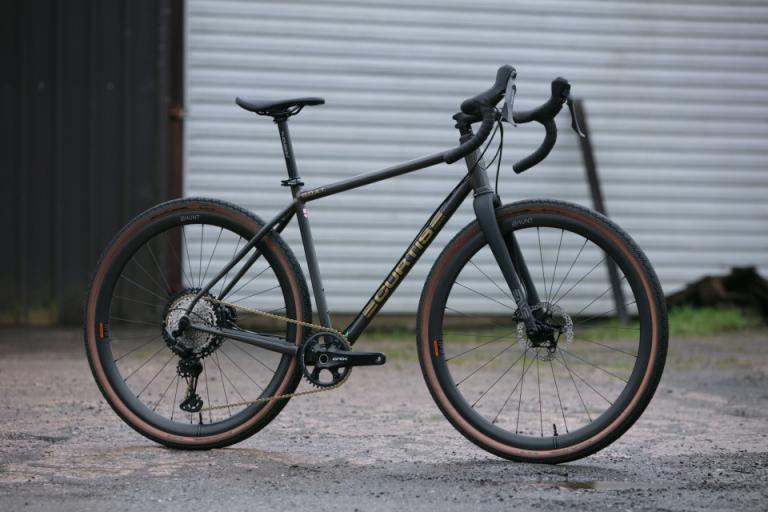

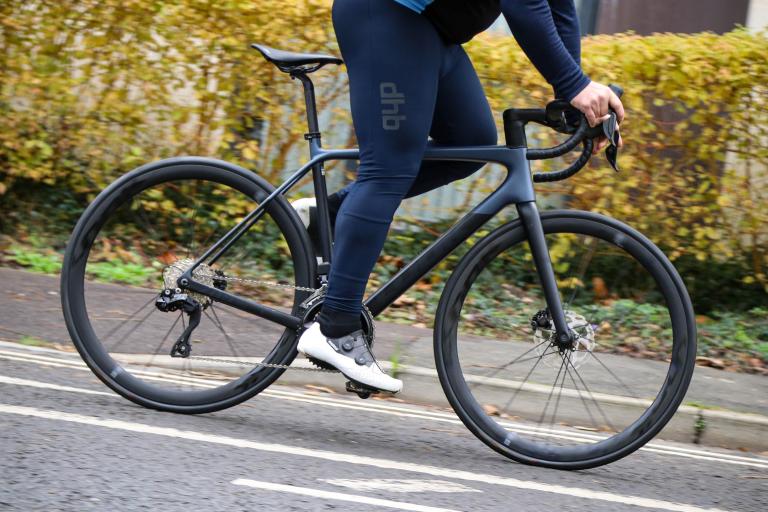
Add new comment
5 comments
So, road.cc
This is exactly the type of bike I could be convinced to blow money on.
But having had both in recently is it this or the Mason Resolution?
Bespoke vs. mass produced. Any colour you like. Highly customisable. If you ask me, I'd say it is an easy decision.
Of course, I am biased.
I'd rather a Surly Straggler
Two things:
1. Lovely grapics/paintjob
2. That fork looks like it can handle more than 28c tyres with mudguards. Why not raise the seatstay bridge a bit instead of making it the limiting factor? I don't see why that would hurt, and people wanting to run wider than 28c with their guards fitted could do that.
Masterchief: Thanks for the kind comments!
You are entirely spot on about the fork, it can take more than 32c.
The seat stay bridge spacing has been set to give a sensible clearance in the configuration most bikes will be used in - i.e. with 28c tyres. If we made the standard clearance greater, the guards would either require spacers or would be compromised with 28c rubber. As they are, you can sneak a 32c in with full guards, but the clearance is a bit tighter than I'd be comfortable allowing for the inevitable detritus and wheels potentially being knocked out of true.
However, as they are all built to order, it would certainly be possible to request rear seat- and chain stay bridges positioned for 32c + guards.